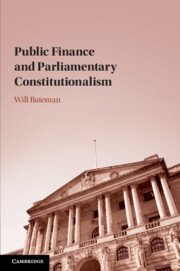Book contents
- Public Finance and Parliamentary Constitutionalism
- Public Finance and Parliamentary Constitutionalism
- Copyright page
- Dedication
- Contents
- Figures
- Preface
- Acknowledgements
- Notes on the Text
- Abbreviations
- 1 Finance and Constitutionalism
- Part I Historical Development of Parliamentary Public Finance
- Part II Parliamentary Public Finance in Operation
- Part III Evaluating Parliamentary Public Finance
- 9 Failure of Parliamentary Control
- 10 Theory and Practice of Financial Self-Rule
- Bibliography
- Index
10 - Theory and Practice of Financial Self-Rule
from Part III - Evaluating Parliamentary Public Finance
Published online by Cambridge University Press: 16 September 2020
- Public Finance and Parliamentary Constitutionalism
- Public Finance and Parliamentary Constitutionalism
- Copyright page
- Dedication
- Contents
- Figures
- Preface
- Acknowledgements
- Notes on the Text
- Abbreviations
- 1 Finance and Constitutionalism
- Part I Historical Development of Parliamentary Public Finance
- Part II Parliamentary Public Finance in Operation
- Part III Evaluating Parliamentary Public Finance
- 9 Failure of Parliamentary Control
- 10 Theory and Practice of Financial Self-Rule
- Bibliography
- Index
Summary
This final chapter raises a number of normative research questions for future discussion. How much financial power should be concentrated in representative assemblies? Does law govern the state if not enforced by the judiciary? Should an analytical wall be constructed between 'public' and 'private' finance in constitutional thinking? The promises and limitations of applying some analytical political theories to the design of constitutional institutions are observed, and importance of engaging with data concerning the deliberative capacities and resource constraints incumbent on politicians and public sector employees is emphasised. The conflict between Diceyan models of parliamentary control and modern welfare states is broached, as are the book's points of engagement with the work US constitutional theorists, particularly Scheuerman, Posner and Vermeule. Finally, the position of private financial markets vis-ˆ-vis the state is identified as an important topic in future examinations of finance and constitutionalism.
Keywords
- Type
- Chapter
- Information
- Public Finance and Parliamentary Constitutionalism , pp. 227 - 234Publisher: Cambridge University PressPrint publication year: 2020

